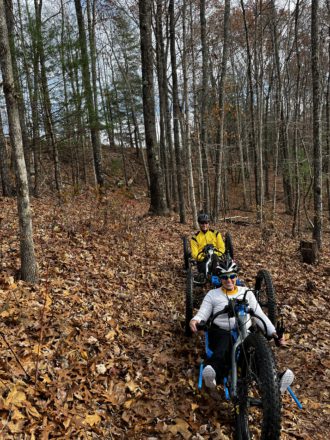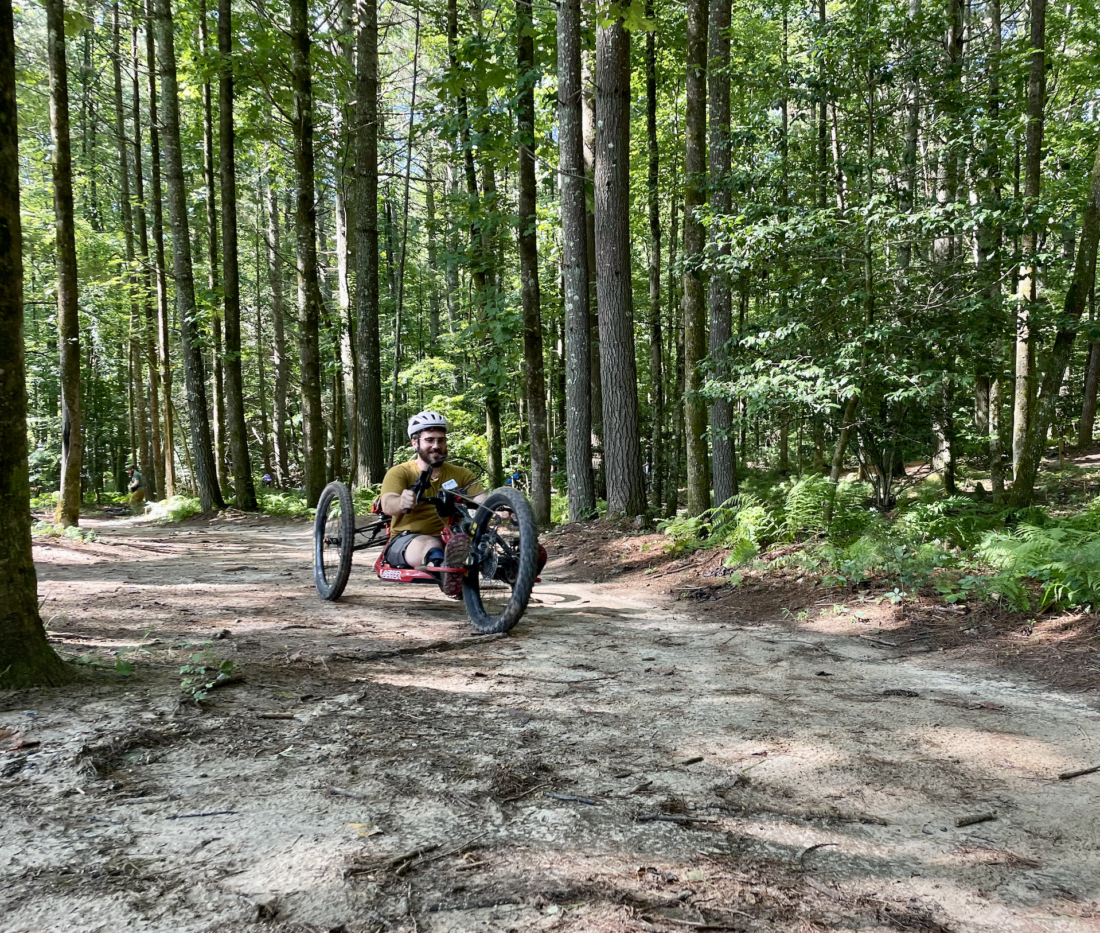Riding a bike in Western North Carolina is an immersive experience of flying on miles of single-track trails, cruising over creeks and under the tree canopy. Yet full access to nature is challenging for mountain bikers living with disabilities.
Aidan Morse, 28, of Hendersonville can ride an upright, two-wheeled bike on flat, paved surfaces like the Asheville Greenway. But mountain biking is difficult for Morse due to a rare neuroimmune disorder that affects his central nervous system. He doesn’t have the balance to navigate the terrain or distances he desires.
That changed one year ago, when Morse explored DuPont State Recreational Forest on a pedal-powered recumbent trike. It puts a rider in a reclining position and makes the trike easier to control. Recently, Morse traded the trike for a recumbent handcycle, which he pedals with his arms since he has no feeling in his feet. “It’s a great way to gain confidence and find paths through technical parts of a trail,” Morse says. “It also feels good to be outside and move.”
The bikes Morse propels are on loan from the Asheville chapter of Catalyst Sports, a nonprofit that sponsors monthly rides, climbs and kayak opportunities in the Southeast for people who have physical disabilities. Catalyst Sports is partnering with Ride Kanuga, a rider-built mountain bike park in Hendersonville, to host a downhill adaptive mountain bike race and skills clinic at its facility Friday-Saturday, Sept. 2-4.
Last year’s inaugural race took place on Ride Kanuga’s Evergreen trail, which will be used again by this year’s racers. It’s the easiest option but still sets up riders for a challenging series of small humps and steep rounded corners.
The race will be a chance for athletes with disabilities and their volunteer support bikers to safely hit a trail together.
“If you were a racer before sustaining an injury and you wanted to race again, there needs to be an opportunity for you,” says recreational therapist and Catalyst Sports founder Eric Gray.
Assessing capabilities
Maggie Frederick and Brad Smith are adaptive riders based near Atlanta who regularly come to Pisgah National Forest and DuPont in search of backcountry trails.

Frederick, 33, was born with spina bifida; she started climbing with Catalyst in Atlanta in 2015 and took up mountain biking in 2020. “Being in the woods is a different experience than what other sports offer,” she says. “You can’t compare it to anything else.”
Smith, 46, lived in Asheville, when 13 years ago a car sideswiped him on his bike, resulting in a T10 spinal cord injury. After rehab, he returned in 2021 when Catalyst’s Asheville chapter biking volunteer coordinator Matthew Kirby showed him around. Smith got hooked.
Adaptive riders like Smith and Frederick want a challenge while also having a lot of fun. This is the expertise of professional paraplegic athlete and consultant Jeremy P. McGhee, who has ridden Ride Kanuga’s and DuPont’s trails as research for the disabled athletic community. McGhee’s nonprofit The UNPavement Project is dedicated to documenting how safe a trail is for everyone who rides it.
“The interests and motivations of the adaptive rider spectrum are huge,” says McGhee. Riders can range from those who want to get rowdy on a trail to those whose disabilities are so involved it takes three volunteers just to maneuver a bike around in a field.
McGhee’s assessments show a rider where support is recommended. “I ride as the average rider, based on ability, disability and equipment capability, and estimate about what 70% of riders will encounter,” he explains.
His research helps newbies like Shannon Slater, 54, of Hendersonville, who has Parkinson’s disease. She began riding three months ago, for the first time in her life, with Catalyst. Mountain biking has been a life-affirming experience. “The forest is where I rejuvenate, and it’s where I don’t have Parkinson’s for a few hours,” Slater says.
The e-question
Many of us are familiar with electric bikes, or e-bikes, as a more environmentally friendly mode of transport. Bikes with a throttle, electric motor and other advanced assistive technology also make maneuvering certain spaces easier for anyone, including those without disabilities. As a result, trail users of all abilities have embraced e-bikes.
The Americans with Disabilities Act states commercial facilities must allow transportation for people with disabilities who use power-driven devices. However, e-bikes are not considered to be mobility aids in the same way as power wheelchairs, and thus e-bikes are only used in places where all motor vehicle use is allowed. E-bikes fall into the same category as off-road vehicles and are presumed to make trails more dangerous for users.
E-bike access for riders who are disabled can come down to individual parks. Currently in Pisgah, trails are closed to all motorized activity. However, Gray says Catalyst athletes on e-bikes gained access to DuPont after rangers received more education about how power-driven vehicles made the trails more accessible to adaptive riders.
Morse notes that he can’t walk or drive without an ankle brace or enjoy the outdoors without an adaptive bike. “I know [they are] polarizing, but mobility aids are freedom,” he says.
Environmental impact
Mountain biking landscapes are another area where adaptive riders’ needs take some consideration. Preservation is a key concern of those who love the outdoors. But sometimes, it isn’t possible to make a trail more accessible to adaptive riders without alterations to the land.
The challenge for trail builders is balancing sustainability with “staying appealing to those demanding more variety from a trail,” says Jon Lane of G5 Collective, a nonprofit that maintains trails in five Western North Carolina counties. For example, Butter Gap Trail in Transylvania County is being extended, which will give seasonal riders access year-round. But it is also being narrowed due to boggy intersections and erosion concerns, says Jared Hartman, trail coordinator for the Asheville chapter of the Southern Off-Road Bicycle Association.
Water crossings can potentially be tricky for a rider seated closer to the ground who has limited strength to remove herself from a creek bed. Laying rock features into the water, rather than constructing bridges over water, can add access for adaptive riders without putting additional construction stress on the area, says Lane.
Hartman was surprised to learn how the smallest adjustment to a trail can make a big difference for adaptive riders. “We assumed we needed wider, new trails but everybody’s got different levels they are comfortable riding,” he says. Trails may only need minor tweaks, rather than full face-lifts.
Shredding misconceptions
Ride Kanuga manager Callie Horwath learned more about adaptive riding in 2021 during a mountain biking festival in Knoxville, Tenn., where Catalyst offered a clinic. Planning the upcoming race at Ride Kanuga has also expanded her thinking on the meaning of accessibility. “Catalyst has taught me subtle nuances that are overlooked for people with disabilities, like parking, restrooms and travel,” she says.
These are issues SORBA and G5 Trail Collective consider as they build trails in the U.S. Forest Service’s ranger district. At Old Fort’s Gateway trailhead, for example, the Meadows Loop will have an accessible trail and accessible bathrooms located near a spacious parking lot.
Yet more can always be done. Lisa Jennings, recreation and trails program manager with the Pisgah Ranger District, says that e-bike and adaptive equipment policies need updating across the board. Projects like the Meadows Loop “are opportunities to make little changes, to show people that there is a need,” she says.
Meeting that need goes a long way toward making all riders feel welcome. “What is memorable about riding [in WNC] was that I felt included and seen,” says McGhee.
Horwath recalls last year’s Ride Kanuga race, where trail conditions had little visibility and it was pouring rain. “I shouldn’t be surprised by this, but the riders went up and continued their runs,” she says. “I realized they’ve faced bigger adversity in their life than riding in a storm.”
Editor’s note: The author is a freelance journalist and current volunteer with Catalyst Sports in Asheville.



Before you comment
The comments section is here to provide a platform for civil dialogue on the issues we face together as a local community. Xpress is committed to offering this platform for all voices, but when the tone of the discussion gets nasty or strays off topic, we believe many people choose not to participate. Xpress editors are determined to moderate comments to ensure a constructive interchange is maintained. All comments judged not to be in keeping with the spirit of civil discourse will be removed and repeat violators will be banned. See here for our terms of service. Thank you for being part of this effort to promote respectful discussion.